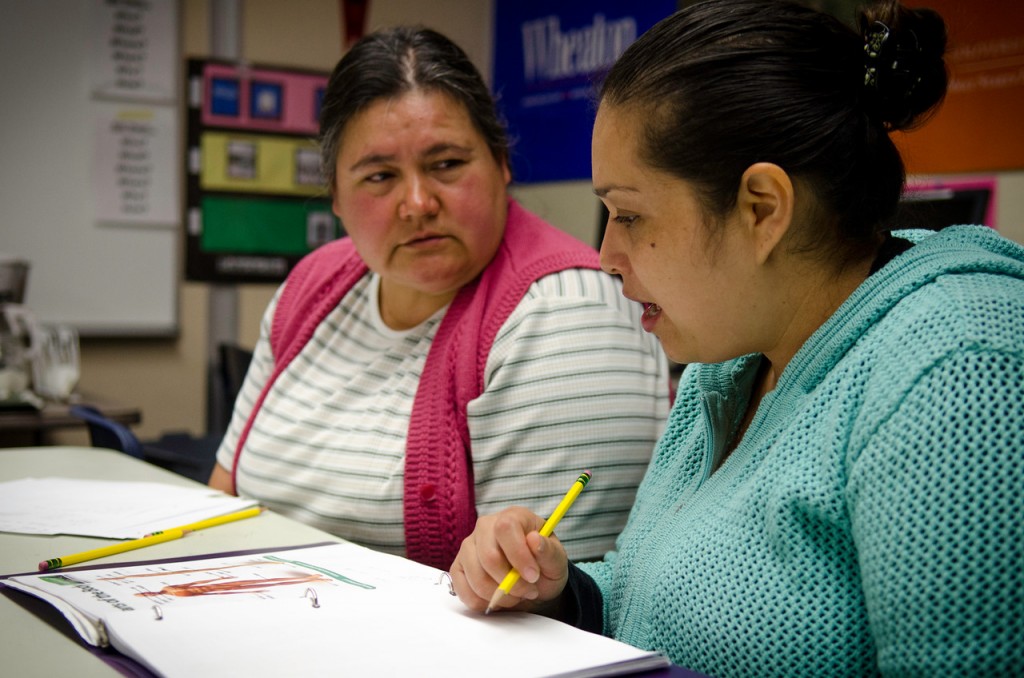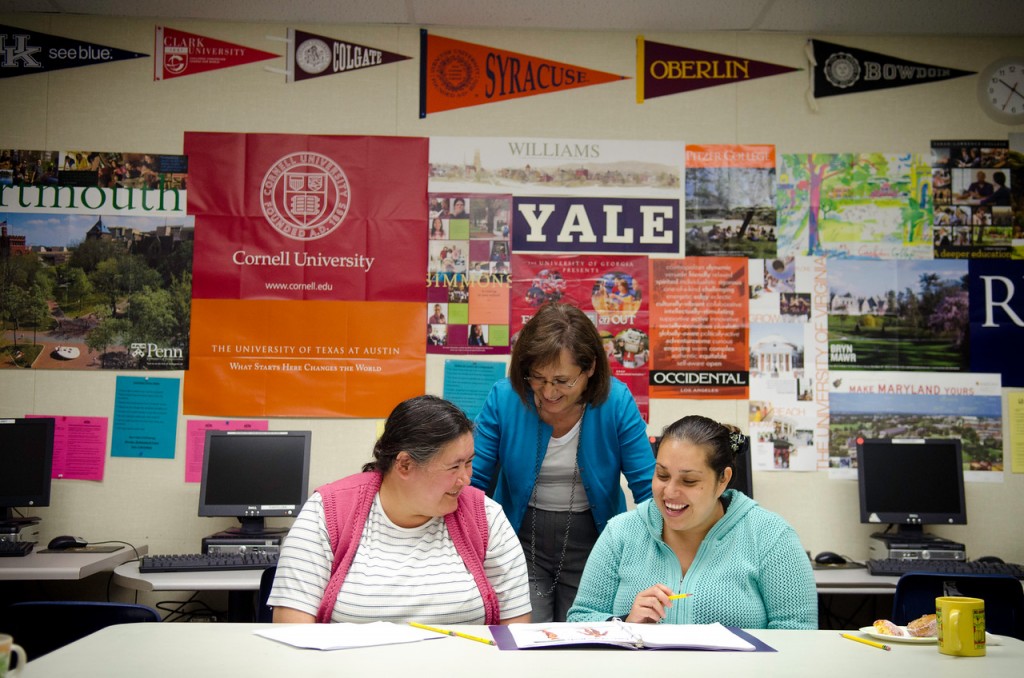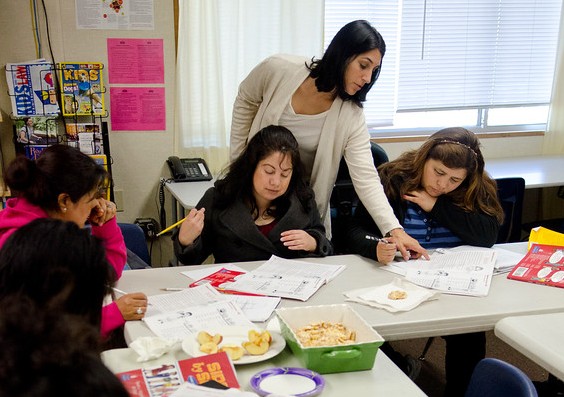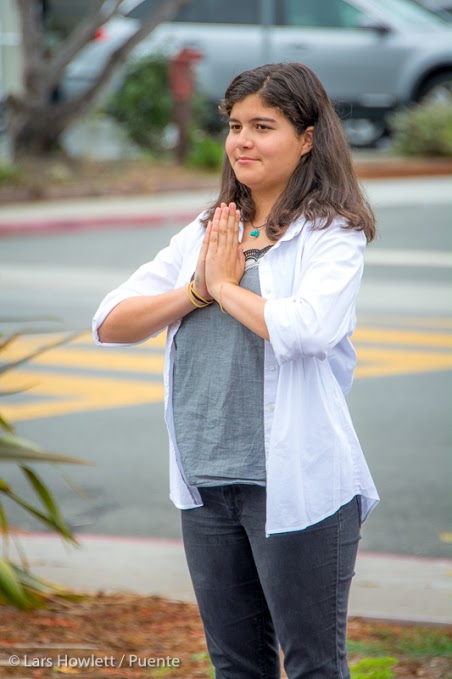Mayte Enriquez hates math, and she struggles with the complicated tangle of rules that govern the English language. But the Pescadero resident is determined to master both subjects so she can move on from being a dishwasher and a cashier.
“I’ve never been good at math. But I remember that when I was younger, one of my teachers told me that if there was a subject I didn’t like or I didn’t understand, if I worked hard to master the material, then I could achieve other things in life,” says Enriquez, whose name has been changed because she was not born in the U.S.

Two students in one of Puente’s ESL classes.
For the last several years, Enriquez turned to Puente for free ESL classes that helped her build basic conversational skills. Eventually she progressed through all three ESL levels. Last semester, she was one of eight adults who enrolled in a beginner’s ESL class at Cañada College, a Redwood City-based community college with a satellite program in Half Moon Bay. There she learned “proper” English: grammar and punctuation, tenses and spelling.
For Enriquez, who is 28, it’s not just about wanting to be understood and to converse with the people around her – although it’s plenty embarrassing when she is working at her cash register and customers ask her a question she can’t answer. It’s not simply about getting by. It’s about moving forward in her adopted country – into higher education and a rewarding career that will lift her out of minimum wage.
And as if that weren’t challenging enough, Enriquez is also studying for her GED through Puente, which provides her with one-on-one tutoring and study materials to take the high school equivalency test. She has been working on it for a year, and will stay on course for as long as it takes.
Last semester, she spent two nights a week studying ESL and another two nights a week studying for her GED at Puente.
“My goal is definitely to continue college. I also plan on getting a new career as well. I don’t ever want to think to myself that I should have tried this or done that,” she says.
It’s a sign of strength that adult students like Enriquez are using Puente ESL and GED classes as a springboard to furthering their ambitions. Whether students are in high school or the workplace, Puente works to instill college dreams and then gives them the tools to get there.
Very often this involves helping students overcome barriers to their own education.
Puente Deputy Executive Director Rita Mancera ticks off the list of challenges. “Transportation. Distance. Time. Childcare. What are you going to do if your partner doesn’t support you, or if your partner also wants to take a class? … And this is on top of their full-time jobs.”
Take Enriquez and her classmates last semester, who motivated each other to sign up for the ESL course at Cañada College. Even though the class was in Half Moon Bay, at Cunha Intermediate School, it still meant taking four hours off, two nights a week. They had to meet the bus at 6:30 p.m. (Puente paid to transport them to Half Moon Bay with assistance from the La Honda-Pescadero Unified School District, which got a federal School Improvement Grant to help parents of kids in the school district.)
For Enriquez, that meant sacrificing income and asking her boss for permission to leave work early. Other women in the group are juggling school and parenting very young children. And yet, two of the students are already enrolled in college part-time, working toward a certificate in early childhood education while they also work and take ESL classes at the same time. “They all passed the class together. It’s a huge commitment. They’re very motivated,” says Mancera.
Puente’s leadership in adult education dates back to 2009, when it stepped up to replace an ESL class Cañada College used to offer in Pescadero. One class turned into two, then three. Today there’s one morning ESL class and three levels of classes at night every Tuesday and Thursday.
In 2012, Puente piloted a new, comprehension-based ESL curriculum based on the work of Stanford Prof. Guadalupe Valdés (as distinct from a strict grammar approach).

Stanford Prof. Guadalupe Valdés with two students in one of Puente’s ESL classes.
Puente’s ESL program is growing, and so is the rest of its adult education program. Last summer, Eufemia Castro and Liliana Villalobos were the first two Puente adult students to earn their GEDs. They did so while learning English, working full-time, and raising their children. It took them four years, and there are nine other students following in their footsteps today.
Puente recruits volunteers to mentor Spanish-speaking students who want to excel beyond the primary school education they received in Mexico through a program called Plaza Comunitaria, a primary and middle school curriculum sponsored by the Mexican Consulate.
Last year’s cohort of Puente adult learners, around 100 students, was the largest to date, and “I think this year it will be even more,” says Mancera. The adult education program is sponsored by a grant from the Silicon Valley Community Foundation.
Puente also formed an early childhood education initiative in partnership with the La Honda-Pescadero School District and the Heising-Simons Foundation. Its programs are geared toward improving school readiness for South Coast children – and for their parents, who are learning to engage and to advocate for their kids within the local school district. Puente recently hired Arlae Alston as Family Engagement Project Manager, a new position that will help her oversee everything from Raising a Reader + Family Nights and Abriendo Puertas, to training local childcare home providers. Prior to this, Alston worked as a part time early literacy specialist with Puente.
She will be working closely with Noel Chavez, a former Cañada College recruiter and outreach coordinator who is Puente’s new Education Director. Chavez will be using his experience and connections in the community college system to create opportunities for local youth and adults to enter college and pursue their dreams. He succeeds Academic Director Suzanne Abel, who is retiring after a 4-year tenure. “Students need to feel they can accomplish their goals and that they have support after they leave Puente,” says Chavez.
For her part, Abel will use her ‘emerita’ position to mentor some college-bound youngsters and to formalize a scholarly advisory council for Puente that includes faculty and staff from major local institutions, like Stanford University and UC Santa Cruz. Abel counts Puente’s early childhood initiative and the university partnerships among her notable accomplishments. She has helped Puente benefit from the input of researchers and worked with Prof. Valdés to build interpretation services for LHPUSD schools. She helped Pescadero students access pre-college programs at Stanford, and worked with Puente board member Larry Trujillo to bring UC Santa Cruz students into Pescadero classrooms as tutor-mentors and bilingual teacher’s aides.
“The great thing about our partnerships with the La Honda-Pescadero school district is we’re not just looking at the whole person, but the whole family,” says Kerry Lobel, Executive Director of Puente.
ESL classes begin September 1, and staff members are excited about a new development. Starting this semester, the final class of the month will be a ‘conversation café’ with tables set up for students to converse with bilingual volunteers. Mancera expects that some students will opt to sit at tables where they can work to improve their language comprehension. Other students will want to be corrected so they can learn to speak properly.
“There are two big groups – those who want to master speaking English but they don’t care if it’s grammatically correct. They want to be able to get things done,” explains Mancera. “There’s a different group that cares about speaking properly and they want to learn a more academic English. They have aspirations for college.”

Students in one of Puente’s ESL classes.
Enriquez fits into the latter category. But before she can enroll in community college, she’ll need to pass her GED and improve her English. Students like Enriquez have learned all they can from Puente’s ESL program, but their English is not good enough to allow them to enroll in a college training program.
A partnership Puente is exploring with a group of local schools and nonprofits could fill that gap, and possibly establish an adult school in Half Moon Bay and Pescadero.
Puente is part of a new group called the Coastside Collaborative Action Team, a consortium of administrators, teachers, and staff from Cabrillo Unified School District, Cañada College, the La Honda-Pescadero Unified School District, the Half Moon Bay Library and the Career Ladders Project. Together, the group is coming up with a plan to expand adult education on the coast.
“We have a large number of adults who need language and job skills support from the educational system, either because they don’t have the skills needed in the current market, or because they never finished high school or didn’t enter college in their home countries,” says Jenny Castello, a professor and coordinator in the ESL Department at Cañada College.
The adult education initiative is part of a much larger statewide push to better serve the educational needs of adults in California. Under AB 86, the state allotted $25 million in planning grants to community college and school districts.
An adult continuation school would be ideal for Enriquez as she works her way toward a new career. The whole point of learning English, for her, is to learn math – even though it remains her least favorite subject. “A lot of jobs nowadays require a lot of math, so learning that would definitely help,” she says.
As Abel prepares to retire, she sees college horizons opening up not just for South Coast children for their parents, too.
“To see parents pursuing their own education in this country is so powerful. That they can aspire to their own education is an example to their kids – it’s a message to the younger set about what’s possible. There’s nothing more inspiring,” Abel says.
Volunteer for Puente’s Conversation Café! For details, contact Abby Mohaupt at amohaupt@mypuente.org or (650) 879-1691 x114.








